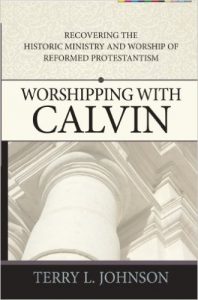The way God is to be worshipped has been historically and continues to be a subject of debate among Christians. The Israelites worshipped the golden calf as a representation of God while Moses was speaking with him; Aaron’s sons, Nadab and Abihu, were incinerated for offering “strange fire,” that is, improper worship; and in the New Testament converts from pagan religions were rebuked for  including pagan practices in Christian worship. A key aspect of the Protestant Reformation was the reformers’ bringing the light of Scripture to expose Roman Catholic practices that had developed through the Middle Ages that were contrary to the teaching of the Bible. The Lutherans excluded from their worship only those practices that the Word specifically prohibited; the followers of John Calvin, the Reformed, organized their worship according to what the Bible specifically commanded. It is clear from the titles of Dr. Terry L. Johnson’s most recent contributions to worship literature which one of these views he has adopted. The books, Worshipping with Calvin: Recovering the Historic Ministry and Worship of Reformed Protestantism, 2014, and, Serving with Calvin: Leading and Planning Services of Worship in the Reformed Church, 2015, are paperbacks that have been published by E. P. Books, Darlington, United Kingdom. Even though the two books are not labeled volumes one and two, they should definitely be read as such with Worshipping considered the first volume.
including pagan practices in Christian worship. A key aspect of the Protestant Reformation was the reformers’ bringing the light of Scripture to expose Roman Catholic practices that had developed through the Middle Ages that were contrary to the teaching of the Bible. The Lutherans excluded from their worship only those practices that the Word specifically prohibited; the followers of John Calvin, the Reformed, organized their worship according to what the Bible specifically commanded. It is clear from the titles of Dr. Terry L. Johnson’s most recent contributions to worship literature which one of these views he has adopted. The books, Worshipping with Calvin: Recovering the Historic Ministry and Worship of Reformed Protestantism, 2014, and, Serving with Calvin: Leading and Planning Services of Worship in the Reformed Church, 2015, are paperbacks that have been published by E. P. Books, Darlington, United Kingdom. Even though the two books are not labeled volumes one and two, they should definitely be read as such with Worshipping considered the first volume.
Dr. Johnson has been the pastor of Independent Presbyterian Church, Savannah, Georgia, since 1987. His two volumes evidence his years of study of, concern for, and practice of well ordered worship, and they are the enhanced and published form of his Doctor of Ministry thesis at Erskine Theological Seminary, “A  Study of Making the Case for Historic Reformed Worship,” 2008. As his forty-seven page bibliography in Worshipping proves, he has read comprehensively in the field books by authors with a variety of views including those not friendly to his own. He has also written previously about worship in, Contemporary Worship: Thinking about its Implication for the Church, 2014; Leading in Worship, Revised and Expanded Edition, 2013; and The Family Worship Book, 1998, 2003.
Study of Making the Case for Historic Reformed Worship,” 2008. As his forty-seven page bibliography in Worshipping proves, he has read comprehensively in the field books by authors with a variety of views including those not friendly to his own. He has also written previously about worship in, Contemporary Worship: Thinking about its Implication for the Church, 2014; Leading in Worship, Revised and Expanded Edition, 2013; and The Family Worship Book, 1998, 2003.
The single word that summarizes his views regarding worship is Scripture. For Dr. Johnson, corporate worship involves the use of the Bible from its call through the benediction. Scripture is to be read, prayed, sung, preached, and confessed issuing forth as wave after wave of the water of life. The sacraments of baptism and the Lord’s Supper are accompanied by their scriptural warrants. Just as the Bible should be read from both testaments, lectio continua, and not merely favored selections, lectio selecta, sermons should also follow the books of the Bible in systematic exposition. The Bible is God’s infallible Word for bringing the lost sheep into the fold and feeding them for spiritual growth. Jesus informed the woman of Samaria in John 4:24 that, “God is spirit, and those who worship him must worship in spirit and truth.” Worship is a spiritual event accomplished physically through fundamental and essential elements as regulated by Scripture. The Word is truth; it is the means to the Christian’s sanctification as Jesus said in his High Priestly Prayer in John 17:17. Christian corporate worship provides the means for congregants to grow in grace as they are cultivated with the sanctifying Word. Dr. Johnson’s Bible centered presentation in Worshipping and Serving provides the foundation and program to achieve Sola Scriptura corporate worship.
 The author has given a fair presentation of his case wile interacting with proponents of what is gathered in current Christianity in the ambiguous category of contemporary worship, but he does take a few little jabs at differing views here and there. Dr. Johnson provides answers to just about any question one can come up with respecting worship while making the historic case for Reformed worship. Everything from the lighting in the church, to the appearance of the grounds, to the reading and preaching of the Word, and other details of worship are discussed. Those who have not read books regarding the historic theological foundation for regulated worship and its implementation should read Worshiping and Serving, then consider how services could be Scripture filled and God honoring as the gospel call goes forth and spiritual food for growth in grace is proclaimed.
The author has given a fair presentation of his case wile interacting with proponents of what is gathered in current Christianity in the ambiguous category of contemporary worship, but he does take a few little jabs at differing views here and there. Dr. Johnson provides answers to just about any question one can come up with respecting worship while making the historic case for Reformed worship. Everything from the lighting in the church, to the appearance of the grounds, to the reading and preaching of the Word, and other details of worship are discussed. Those who have not read books regarding the historic theological foundation for regulated worship and its implementation should read Worshiping and Serving, then consider how services could be Scripture filled and God honoring as the gospel call goes forth and spiritual food for growth in grace is proclaimed.
Barry Waugh





